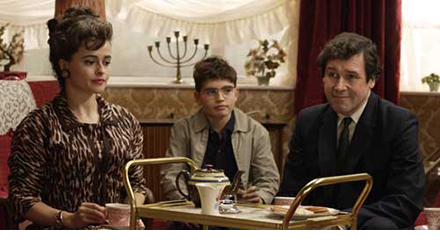 Admittedly, I went to see “Happy-Go-Lucky” as a diversion on the early evening of the most anticipated election night.
Admittedly, I went to see “Happy-Go-Lucky” as a diversion on the early evening of the most anticipated election night.
As the film begins, Pauline ‘Poppy’ Cross (Sally Hawkins), the embodiment of the title, is shown riding her bicycle, helmetless, along London streets from Granby Place to Finsbury Park with a sweetly goofy smile creasing her face, and it quickly became easier to forget politics.
The present-day story is quite straight-forward and carries a familiar tone for a Mike Leigh film; It’s not a tumultuous time in Poppy’s life — we follow the 30-year-old as she bops along to work, cavorts at a flamenco dance class, learns to drive and latterly embarks on a relationship — but the film captures wonderfully how Poppy embraces the prosaic earnestly and fully. She is a primary school teacher of a multicultural class of 7 and 8-year-olds who seems to relish cutting, painting and clucking around in a chicken mask as much, if not more so, as the children do. For the best part of a decade, Poppy, who dresses in outfits pinched from Pat Benatar’s “Love is a Battlefield” video, has lived with her acerbic flat mate and fellow teacher, Zoe (Alexis Zegerman). Together they enjoy nights out at the disco with the girls but they’re not a frivolous duo and while they’re both seeking substantial relationships, there’s no self pitying in their bemoaning the lack of prospects.
As befitting a Mike Leigh film, the movie isn’t skewed to the sweet side completely. With her bike stolen, which she accepts with a good natured shrug, Poppy decides to learn to drive and engages the services of an instructor. Initially Scott (Eddie Marsan) appears to be a stern tutor but as the weekly lessons continue, he becomes increasingly vitriolic, especially when he bemoans a nation he perceives as under threat from the melting pot; he doesn’t see it as half-empty or half-full but overflowing. But Poppy is no dupe. She mocks him with snarky asides, her sense of humor hardly disguising her growing unease with his small-minded nastiness. Yet, she does want to understand where his frothing anger comes from, why his Britain is not her Britain, how he despises the beauty she sees so clearly in her classroom, and the final lesson between the two is kinetic without being overwrought.
In films such as “Life is Sweet” and “Secrets & Lies,“ Leigh has tamped the quotidian lives of ordinary people to unearth splendid insights into the human condition. Leigh orchestrates one of these moments in “Happy-Go-Lucky” when Zoe, Poppy and her incorrigible youngest sister (Kate O’Flynn) visit their married middle sister, Helen, smugly ensconced in suburbia, with her overmatched husband, Jamie (Oliver Maltman). Pregnant and insecure, Helen (Caroline Martin) goads and chides Poppy about family, children and mortgages, remonstrating that her older sister can‘t be as cheerful as she purports to be. Poppy delivers a heartfelt and assured defense. The tension is heightened above a simmer but doesn’t explode, so that like so many family moments, Helen slinks off to bed in a sulk, the remaining unease as uncomfortable as a pull-out sofa sleeper.
With an actress of less acumen and poise, Poppy may have devolved quickly into an insipid caricature. Luckily, Hawkins plays the part with ample integrity and intellect. She dispatches naiveté as Poppy’s cheeky, fun-loving persona is grounded in a conscientious and sensible ethic. Vitally, “Happy-Go-Lucky” is centered around this performance of exquisite bravura.
A curmudgeon could balk at Poppy’s sunny disposition, her indefatigable spirit could be dismissed as twee, and her irresistible optimism could be condemned as unrealistic and childish, but when the film was over, and I stepped outside the theater, and the world had won, and it seemed like every face was plastered with a sweetly goofy smile, it was as though a planetful of Poppy’s had sprung up, each giddy with a good natured last laugh for the cynics.

